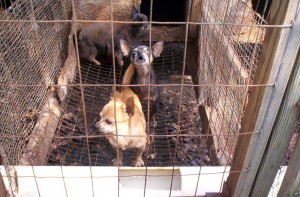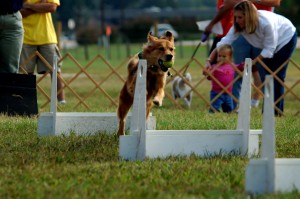From reading Parts 1 and 2 you accept the responsibilities of becoming a dog owner, have decided upon the age and gender of your pet, and narrowed your breed alternatives to anywhere from one to three potential breeds. Congratulations! You have made great progress in defining the “right dog” for your household. Next, before you purchase or adopt your puppy or dog, we need to discuss how to evaluate potential breeders, shelters, and rescue agencies.
If you are considering purchasing a puppy or adult dog from a professional breeder or backyard breeder, read all of the following section, entitled “Before Visiting a Breeder Facility.” If you are interested in purchasing a puppy, the entire section applies. If you are interested in an adult dog, much of the section applies. Then read the second section, “When Visiting a Breeder Facility.”
If you are interested in adopting a puppy or dog from a shelter or rescue agency, you will wish to take modified action on numbers one, two and four below, then skip to the next section entitled “When Visiting a Breeder Facility.”
1. Ask for References: Ask for references from prior breedings, especially those from the sire and dam that parented the litter you are considering. If you are considering an older puppy or adult dog, ask for references who have purchased dogs of similar age and references who purchased siblings of the dog.
2. Interview the Breeder Over the Phone: Do not visit unless you trust that the breeder is candid, knowledgeable, and passionate. Ask if the breeder has a goal behind the breeding program, such as to improve structure, create greater working drive, or produce a calm household pet. Prefer an honest, goal-oriented breeder, rather than a breeder whose primary goal is simply to make money selling puppies. Consider whether the breeder interviews you. The most professional breeders interview purchasers thoroughly to ensure that puppies are placed in responsible, appropriate homes.
3. Ask whether the sire and dam possess pertinent health certifications: Professional breeders, especially those handling larger breeds will own breeding stock certified from the Orthopedic Foundation for Animals (OFA) as free from hip and/or elbow dysplasia and possibly the Canine Eye Registry Foundation (CERF) to show they are free of genetic vision abnormalities. If pertinent for the breed, ask if the breeder has tested the sire and/or dam for Von Willebrand’s (canine hemophilia), heart disease, or hypothyroidism. Ask if the sire and dam are current on inoculations, including brucellosis for the dam. Ask if the sire and dam are on a regular flea and heartworm preventive. As you progress in the purchase process, you should request copies of certifications to verify the breeder’s information.
4. Ask to review the sales contract: Insist that the sales contract have short-term guarantees for general health and long-term guarantees for common breed specific genetic defects, such as hip dysplasia. Insist that the guarantees include equitable remedies should the dog appear immediately unhealthy or develop a genetic defect. Insist that the contract is conditional upon a veterinary clean bill of health, as determined from a vet visit within the first seven days of purchase or adoption. If you demand a certain temperament or ability, spell out the details in the sales contract. If you desire papers, include the timeframe and the specific registry in the sales contract. If you are considering purchasing or adopting an adult dog, demand a reasonable trial period to diagnose problems from breeder or agency misrepresentation. In addition, ask for a trial period if you are uncertain how the dog will mix with existing pets. Have the price clearly stated in the contract. If you are dissatisfied with the breeder’s or adoption agency’s standard contract, negotiate with a counterproposal.
If you feel comfortable that the breeder is professional, honest, and passionate, that the sire and dam are high quality animals, and that the sales contract is equitable, then proceed by setting an appointment to visit the breeder facility. While there, you will investigate the environment, the parents, and the litter.
Similarly, before you visit a shelter or rescue agency you wish to know something of their reputation, policies, mission, and customer service and you wish to review their sales/adoption contract. Your community will likely contain a number of shelters and rescue agencies that have dogs available for adoption. Therefore, exercise due diligence to ensure that you are comfortable with a specific organization before you visit. Moreover, when you visit complete a similar inspection to that described below for a breeder facility.

1. Investigate the breeder’s home: Does it appear clean and hygienic? Or does it noticeably smell from dirty dogs, urine, feces, or any other malodorous offense that may have you question hygiene and cleanliness? Is there noticeable damage from urine, feces, or chewing? If you wouldn’t live in the breeder’s home due to reasons of hygiene or damage, then don’t buy a puppy or dog that lives in the home. If you are purchasing a puppy or adult dog, all of the preceding applies. If you are adopting a dog, simply revise the preceding questions so they apply to the pertinent shelter, rescue, or foster environment.
2. Observe the sire and dam: Do they exhibit the temperament you desire in a prospective pet? Are they overweight? Do they exhibit orthopedic problems? Do they exhibit other health problems, including skin problems? Do they continue to guard despite the breeder’s request for them to greet you in a friendly manner? Are they especially timid? Many health and temperament traits are inheritable. Therefore, only consider pups from outstanding parents. Moreover, if the breeder does not maintain his/her breeding stock in a healthy and well-managed manner, he/she most likely will provide inferior care and management of the puppies that he/she hopes will leave the house shortly. Prefer puppies from adult dogs that are clean, well kept, trained, well mannered, and display the temperament you eventually desire from your puppy as he/she grows from a youngster into a mature dog. If you are purchasing or adopting an adult dog, ask the above questions regarding the specific dog you are considering. If you are considering adopting a puppy and the mother is present at the shelter, ask the above without amendment. If the mother is not present, consider the above questions in the framework that they apply to the puppy.
3. Observe the litter: Is their enclosure free of urine and feces? Cleanliness is important. Puppies accustomed to unhygienic environments are often more difficult to housebreak and are more likely to manifest stool eating behavior (coprophagy). Do the puppies look happy and healthy? Are they sufficiently active for their age? Are they comfortable with one another? Are they comfortable with you? Do they show undue shyness, resentment, or aggression when held or restrained? Do they have distended bellies (which can indicate parasitic problems)? Are their eyes, ears, and genitals free of infection and inordinate odor? Do any of the puppies have an abnormal nasal discharge? Do they exhibit any skin abnormalities, such as mange? Are they free of fleas? In males, have both testicles dropped? Have they been inoculated and de-wormed according to a standard veterinary schedule? What efforts have been made to socialize the puppies to people and environmental stress? What age are the puppies? Puppies are best removed from a litter between seven and a half and eight and a half weeks of age. Do not purchase or adopt a puppy earlier than seven and a half weeks. In addition, do not purchase or adopt a puppy removed from its litter later than nine weeks, unless the breeder or agency is doing its utmost to properly housebreak the puppy and ensure socialization opportunities.
Whether you are purchasing, adopting, or considering a puppy or an adult, evaluate all of the preceding factors. If you lack confidence in your ability to accurately investigate and evaluate the relevant criteria, ask a CPT trainer to accompany you on your breeder, shelter, or rescue visit. CPT can consult you on breed selection (see Part 2), breeder evaluation, and evaluation of individual animals (see Part 4).

When completing the decision process, purchase or adopt a happy, healthy, well-tempered pet maintained in a clean environment and in accordance with sound veterinary practices. Do not fall into the trap of purchasing or adopting a sickly, shy, or aggressive puppy or dog or one kept in an unhygienic environment because you feel sorry for the dog. Moreover, do not out of sympathy adopt an adult dog that has demonstrated a history of poor housebreaking behavior, separation anxiety, destructive behavior, inappropriate or excessive barking, escape behavior, extreme shyness, or aggression to people, dogs, or cats. Instead, make life easier for yourself, your family, existing pets, and your new dog, by purchasing or adopting a dog that exhibits a high probability of easily becoming a compatible fit within your household.
© Copyright Mark Spivak and Comprehensive Pet Therapy, Inc., April 2007, Revised March 2014. All rights reserved.